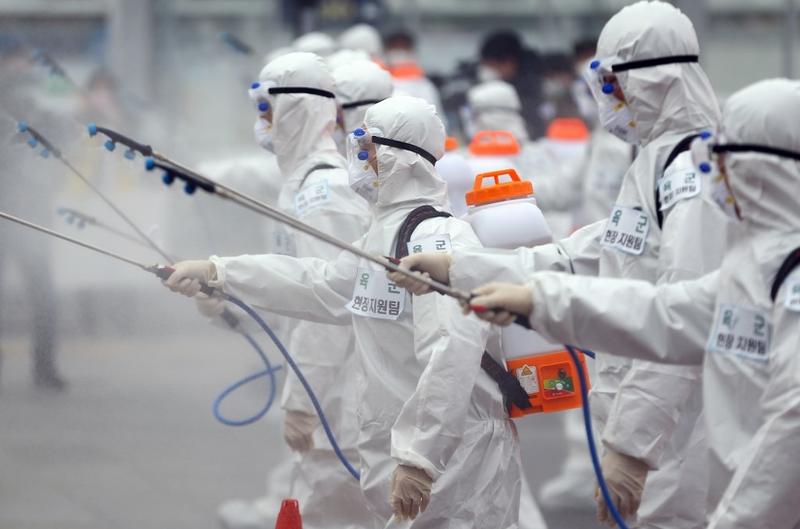 Soldiers of the Republic of Korea wearing protective gear spray disinfectant as part of preventive measures against the spread of the COVID-19 disease at Dongdaegu railway station in Daegu, Feb 29, 2020. (YONHAP / AFP)
Soldiers of the Republic of Korea wearing protective gear spray disinfectant as part of preventive measures against the spread of the COVID-19 disease at Dongdaegu railway station in Daegu, Feb 29, 2020. (YONHAP / AFP)
SEOUL – Churches were closed in the Republic of Korea (ROK) on Sunday with many holding online services instead as authorities fought to rein in public gatherings, with 586 new coronavirus infections taking the tally to 3,736 cases.
That came a day after the biggest daily jump of 813 cases in the ROK’s battle with the largest virus outbreak outside China, the Korea Centers for Disease Control and Prevention (KCDC) said. The death toll rose to 18.
In Seoul, the capital, about a dozen worshippers were turned away from the Yoido Full Gospel Church, which put a sermon for its 560,000 followers on YouTube, filmed with a small choir instead of all 200 members and 60-strong orchestra.
ALSO READ: Thailand, Australia record 1st coronavirus deaths
“I had heard there would be no service, but just came to check as I live nearby, but yes, it is so empty,” said one of them, Song Young-koo, as he left the ROK’s biggest church.
Of the 586 new cases, 333 were from the southeastern city of Daegu, the location of a church at the center of the outbreak, and 26 from the nearby North Gyeongsang province
“It’s a wise decision to do it online, since the virus would easily spread at mass gatherings and churches can be no exception.”
Authorities have warned of a “critical moment” in the battle on the virus, urging people to refrain from attending religious services and political events and stay home this weekend.
For the first time in its 236-year history, the ROK’s Catholic church decided to halt masses at more than 1,700 locations nationwide. Buddhist temples also called off events, while major Christian churches held online services.
Of the new cases, 333 were from the southeastern city of Daegu, the location of a church at the center of the outbreak, and 26 from the nearby province of North Gyeongsang, KCDC said.
The agency said some church members in January visited the central Chinese city of Wuhan, the epicenter of the disease, adding that it was investigating to determine if the trip played a role in the outbreak.
“We’re tracing back how many members had gone to China,” its deputy director, Kwon Jun-wook, told a briefing.
“Our top priority is to find out how the coronavirus has been transmitted so widely among the Shincheonji followers,” he added, in a reference to the church involved.
The numbers of cases was likely to continue growing in early March, he added, pledging greater efforts to rein in key infection sources.
READ MORE: Hokkaido declares emergency, S. Korea infection tally tops 2300
At a news conference in Seoul a group of doctors and chiefs of public hospitals urged the government to combat a shortage of beds by assigning them to the critically ill, after two patients died in self-quarantine at home.
HELP FOR DPRK
ROK President Moon Jae-in called for unity and vowed greater efforts, including an extra budget, to fight the outbreak, in a speech.
“The outbreak can threaten our lives temporarily, but it cannot break our unity and hope,” he said.
Moon proposed joint efforts with the Democratic People’s Republic of Korea (DPRK) to prevent an outbreak in the neighbor and improve healthcare.
The DPRK has not confirmed cases, but has ordered a month in quarantine for those with symptoms, while state media said leader Kim Jong-un held a meeting on tougher measures.
The crisis spooked trade and financial markets, leading Samsung Electronics, Hyundai Motor and LG Display to temporarily shut down a plant each and prompting boy band BTS to cancel a world tour set for April.
More neighbors suspended flights and banned visitors from the ROK.
In a statement, the foreign ministry said Foreign Minister Kang Kyung-wha asked Washington to avoid “excessive action that could needlessly shrink exchanges between both countries,” during a telephone call with US Deputy Secretary of State Stephen Biegun on Sunday.
The request came after the United States advised Americans not to travel to hard-hit regions, such as Daegu.


